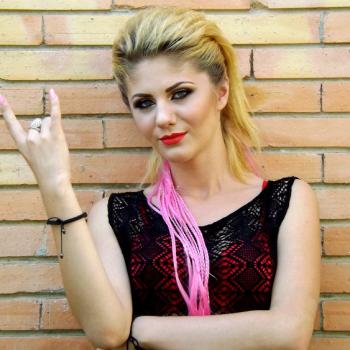
Ableism is a loaded term, sometimes misused and appropriated by others who don’t understand its validity and the need for a real, honest look at people’s limitations and what they can do–and can’t do–about said limitations. Too often people face real discrimination based on those boundaries, and unfortunately much of that attitude has spilled over into the pagan, occult, and witchcraft communities. And we need to actively examine what lies beneath that attitude, and what we can do in order to conquer our own internalized ableism.
The need for understanding accessibility comes in many forms including chronic health conditions, mental health issues, as well as mental and physical disabilities. When it comes down to magic and witchcraft, people need to understand the following:
- There are some things in life that magic cannot solve, either due to personal and/or human limitations.
- Magic itself is an ability and comes in the form of many different abilities, which not all people happen to or can possess.
- Psychic abilities also run along similar lines to above.
- Blaming someone for their health and disability issues is not only ableist, but is a part of the toxic positivity and New Age victim blaming I have blogged about in the past.
The unnecessary finger pointing can be external, but it can also be internal. Internalized ableism is a thing. There is a very real need to acknowledge the fact that while a lot of us go on about tough love and “doing the work”, there are times when either mental or physical health and ability can impact your personal practice and development as a witch/magician/occultist.
Examples can be as simple and seemingly benign as expecting other people to always be able to visualize in order to be able to practice magic and witchcraft when there’s an actual condition out there that prevents people from being able to visualize known as aphantasia. Making it a requirement to visualize for a magical student could very well be considered ableist. There are many ways to be able to engage psychic senses that don’t include vision: such as sensation in the form of temperature, sensing in terms of overall impressions or concepts, feeling as emotional input, and auditory. I personally engage in many of these and while I am an excellent visualizer I have found that my ability to pick up on impressions, concepts, and “energy” reveals a far greater, nuanced picture than simple imagery.
Obviously the ability to visualize alone is not the only example, and there are also more severe ones. The ability to maintain a personal practice while battling depression and/or other mental health issues can be challenging, and it is honestly damaging to suggest that magic and/or prayer alone can help overcome these hurdles. And it’s also another form of ableism to suggest that this can be a thing. It can certainly aid in addition to practical work, but the reality is that there are many forms of self care and treatment depending on the issue and situation, and they are just as important and a part of the magical practice as the actual magical practice. Call it meta-magic if you will.
Let me emphasize right now: self care is a very important part of magical practice and this is universally true regardless of your mental and physical health as well as your own personal capacity. You have to put in your own oxygen mask before assisting other people and serving the gods. The gods do not demand a broken vessel; they want you to be at your best and that means knowing your personal limitations or boundaries. It is not a sign of “laziness”, but rather an innate understanding of how to navigate through the world as a human. Being a witch or a magician requires balance. It also requires the ability to adapt to changes, especially when those changes are drastic and potentially destructive.
I happen to know of a fair number of people who have experienced the befores and afters of abled existence as well as those who have dealt with it most or their entire lives. I can’t begin to tell you how many elite runners and athletes whom I know who are now battling chronic fatigue, MS, rheumatoid arthritis, and a variety of other issues. I personally have gone from being a regular endurance runner and weightlifter to battling a thyroid disorder–very recently diagnosed, in fact–and the difference in my energy levels were drastic enough that I feared having to make arrangements with my place of employment to have a semi-regular work from home schedule. And I am among the lucky ones; I can receive medication and get treatment. Not all conditions currently can be treated. In addition I’ve also battled PTSD for a number of years, so I’m entirely too conscious of the impact mental health can have on your magical practice.
Part of battling expectations in magic and confronting one’s ableism boils down to this: frequently what you expect from yourself you sometimes expect from others. A good part of personal development involves handling one’s reactions to people and sorting through your own biases.
I have found that for the most part, there are two types of people in this regard:
- Those who have ridiculous amounts of perfectionism in themselves and prone to martyrdom at the expense of themselves, ie. not remembering to put on one’s own oxygen mask first. I readily own and admit to being in this category and have actively worked on it and in some respects still am.
- Those who have insane levels of expectations for themselves and insist upon the same for others. Often these are people who from childhood had these expectations placed upon them.
The first can lead to burnout and the second can lead to a lack of empathy and compassion for others. But both suffer from the same thing: a lack of compassion for themselves, first and foremost.
That lack of compassion for others can lead to people accusing other occultists of not being effective enough magicians: “But surely if your magic was effective/real you wouldn’t have these issues?” I see a similar problem in questioning why people have personal problems of any sort ranging from relationships to finances. While it’s true that personal development can resolve common sense problems, there are just genuinely times when people face situations out of their control. It took me years to master financial magic to get me to where I am now; it’s not an easy discipline. And it’s even harder to learn how to do when battling emergency after emergency; your resources are already taxed and the odds are against you. It’s a similar situation when dealing with other problems such as mental or physical health. And there are times as I said earlier that magic just simply isn’t going to cut it for whatever reason. It is neither a personal failing nor an indicator that magic in general is ineffective; it just is. Like science, it is limited to our current technology and understanding and we just don’t have it right now.
It’s absurd to suggest that any witch or magician who has any sort of health or personal issues is somehow a lesser skilled one. Some of the most magically efficacious and amazing occultists I know also have fibromyalgia, chronic fatigue, MS, PTSD, depression, bipolar, etc. A good chunk of what makes them effective is their ability to manage self care and practical treatment. I also personally think that having confronted head-on your own limitations as a human being is a very healthy thing in any individual regardless of ability.
Whatever struggles you may have in your spiritual and/or magical practice, you are valid and you are not alone.
















